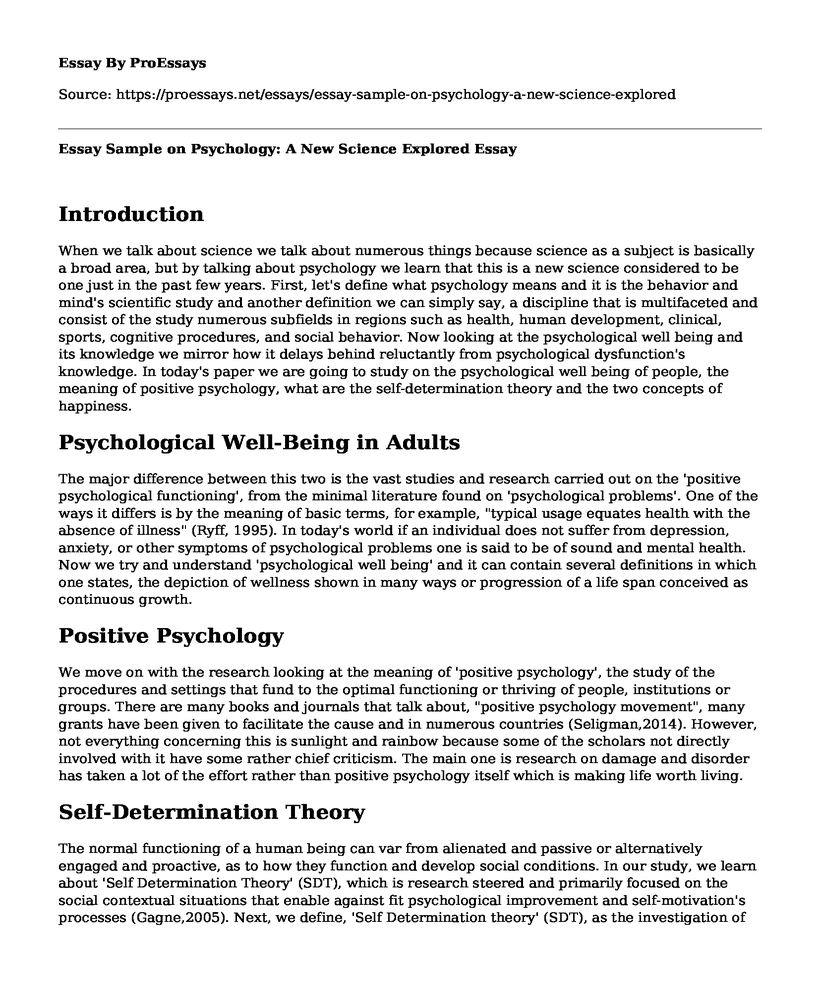Introduction
When we talk about science we talk about numerous things because science as a subject is basically a broad area, but by talking about psychology we learn that this is a new science considered to be one just in the past few years. First, let's define what psychology means and it is the behavior and mind's scientific study and another definition we can simply say, a discipline that is multifaceted and consist of the study numerous subfields in regions such as health, human development, clinical, sports, cognitive procedures, and social behavior. Now looking at the psychological well being and its knowledge we mirror how it delays behind reluctantly from psychological dysfunction's knowledge. In today's paper we are going to study on the psychological well being of people, the meaning of positive psychology, what are the self-determination theory and the two concepts of happiness.
Psychological Well-Being in Adults
The major difference between this two is the vast studies and research carried out on the 'positive psychological functioning', from the minimal literature found on 'psychological problems'. One of the ways it differs is by the meaning of basic terms, for example, "typical usage equates health with the absence of illness" (Ryff, 1995). In today's world if an individual does not suffer from depression, anxiety, or other symptoms of psychological problems one is said to be of sound and mental health. Now we try and understand 'psychological well being' and it can contain several definitions in which one states, the depiction of wellness shown in many ways or progression of a life span conceived as continuous growth.
Positive Psychology
We move on with the research looking at the meaning of 'positive psychology', the study of the procedures and settings that fund to the optimal functioning or thriving of people, institutions or groups. There are many books and journals that talk about, "positive psychology movement", many grants have been given to facilitate the cause and in numerous countries (Seligman,2014). However, not everything concerning this is sunlight and rainbow because some of the scholars not directly involved with it have some rather chief criticism. The main one is research on damage and disorder has taken a lot of the effort rather than positive psychology itself which is making life worth living.
Self-Determination Theory
The normal functioning of a human being can var from alienated and passive or alternatively engaged and proactive, as to how they function and develop social conditions. In our study, we learn about 'Self Determination Theory' (SDT), which is research steered and primarily focused on the social contextual situations that enable against fit psychological improvement and self-motivation's processes (Gagne,2005). Next, we define, 'Self Determination theory' (SDT), as the investigation of growth tendencies of people's distinctive psychological needs known to be the source of a human's personality and self-motivation plus the conditions responsible for the positive practices.
"Eudaimonism" and "Hedonic Happiness"
With tons of research aimed at personality psychology and the qualities considered to characterize it are; healthy or optimal or the psychological functioning that is effective. Nonetheless, the theoretical structure that is mainly diverse is carried out on optimal functioning with few determinations designed to concepts of integration or interrelation within diverse theories (Waterman, 1993). There are two main concepts of happiness according to researchers one is known as, "Eudaimonism (a theory of self-realization)", the theory concerns itself with ethics that call on people to recognize themselves and live according to their true self. The other one is "Philosophical Perspective on Happiness" and this consists of, studies about eudaimonism (used by Aristotle to mean happiness) that aim at 'hedonic happiness' a subjective feeling, that one believes to be getting all the beneficial things that one wants and the pleasant feeling that goes along with it.
References
Gagne, M., & Deci, E. L. (2005). Selfdetermination theory and work motivation. Journal of Organizational Behavior, 26(4), 331-362.
Ryff, C. D. (1995). Psychological well-being in adult life. Current directions in psychological science, 4(4), 99-104.
Seligman, M. E., & Csikszentmihalyi, M. (2014). Positive psychology: An introduction. In Flow and the foundations of positive psychology (pp. 279-298). Springer, Dordrecht.
Waterman, A. S. (1993). Two conceptions of happiness: Contrasts of personal expressiveness (eudaimonia) and hedonic enjoyment. Journal of personality and social psychology, 64(4), 678.
Cite this page
Essay Sample on Psychology: A New Science Explored. (2023, Jan 24). Retrieved from https://proessays.net/essays/essay-sample-on-psychology-a-new-science-explored
If you are the original author of this essay and no longer wish to have it published on the ProEssays website, please click below to request its removal:
- Report Example on Personal Strengths and Limitations as a Manager
- Case Study: Postpartum Psychosis
- Assessments on Learning of Students With Low Functioning Autism
- Feeling Bad About Oneself Is a Normal - Argumentative Essay
- Essay Sample on Leading Personality Theorist: Alfred Adler
- Essay Example on Adolescents Need Supportive Environments for Positive Development
- Exploring Magical Realism: Cultural Fusion, Rebellion, and Educational Insights for Youth







